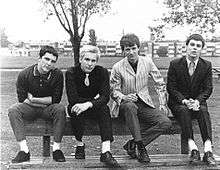Purple Hearts (UK band)
| Purple Hearts | |
|---|---|
 From Record Mirror, February 1980 – "Purple People Eaters" | |
| Background information | |
| Origin | Romford, England |
| Genres | Mod revival |
| Years active | 1977–1982, 1984–1986, 1999, 2009–present |
| Labels | Fiction, Safari, Razor Records |
| Website | Purplehearts.co.uk |
| Members |
Jeff Shadbolt Simon Stebbing Bob Manton Gary Sparks |
| Past members | Nick Lake |
The Purple Hearts are an English mod revival band, formed in 1977 in Romford, eastern Greater London. They were often considered one of the best English mod revival groups,[1] the NME calling them "one of the few mod bands to actually cut it on rock 'n' roll terms".[2]
Career
The Purple Hearts started in 1977, when teenagers Jeff Shadbolt, Simon Stebbing, Bob Manton, and Nick Lake formed the band in Romford as The Sockets, before they even knew how to play their instruments.[3] They formed for the purpose of getting a support slot at a Buzzcocks gig at the East London Polytechnic,[3] to debut their tongue-in-cheek rock opera, Reg. Several gigs followed, including an appearance on a float in the Romford Carnival.
In 1978, their drummer Nick Lake broke his leg. He was replaced by Gary Sparks from Romford punk outfit, 1348.[3] The band switched their name to Purple Hearts, after an amphetamine-barbiturate mixture popular with the mods of the 1960s. Accordingly, they changed their sound from the rough-edged punk rock, to a more mod-influenced sound, which, thanks largely to The Jam, was beginning to capture public attention. In September 1979, the band scored a minor hit with their debut single, "Millions Like Us" which reached number 57 in the UK Singles Chart.[4] The band then toured the UK with Secret Affair and Back To Zero on 'the march of the mods' tour in 1979.[3] The band's second single, "Frustration" was released in November that year. A tour of the UK to promote the single followed.
In 1980, the band released their debut album, Beat That.[3] The album was produced by Chris Parry of Fiction Records. The single taken from the album, "Jimmy", gave the band another minor hit reaching number 60 in the UK chart in March 1980.[4] After the commercial failure of Beat That, the band parted company with Fiction Records,[3] before signing a one off single deal with Safari which produced the "My Life`s A Jigsaw" single, produced by Andy Arthurs. The record did make the BBC Radio One playlist, but did not make the national charts. A final single, "Plane Crash" was released in 1982, on the independent record label Roadrunner Records before the band split up in November of that year after a failed American trip.
After the Hearts, Jeff Shadbolt joined The Rage, who included Brett Ascott from The Chords. Gary Sparks joined High Zierra with former members of Department S, Tony Lourdan, Mark Taylor and Michael Herbage. Simon Stebbing joined Hearts on Fire who recorded an album Dreams Of Leaving and two EPs for Midnite Records. Bob Manton joined Simon Stebbing and Peter Green in the country rock band Owen and the Deacons.
The Purple Hearts resurfaced in 1984 to release a live album, Head on Collision Time (1985) recorded live at the 100 Club, and their second studio effort, Popish Frenzy (1986).[3] The album featured contributions from Michael Herbage on guitar and Brett Ascott on percussion. A single "Friends Again" taken from this album was released on Unicorn Records. In 1986 the group toured West Germany, Austria and The Netherlands before once again calling it a day.[3] They re-convened at the Mods Mayday '99 show, recorded for the Detour Records live compilation album. In 2003, Stebbing produced a rarities compilation, Smashing Time, also released on Detour Records.
The band re-formed in 2009 and played all over the UK, including gigs at London's 100 Club, and Manchester Academy where they were joined on stage by Mani. They continued playing in 2010 and are presently in the fourth year of their reformation.
The band released a new live album from the 2009 tour in April 2010 called Purple Hearts Live! on Pride and Joy Records. This included the band's first new material in 25 years with the track "Urban Soul".
Discography
Singles
- "Millions Like Us" (Fiction) 1979 - UK No. 57[4]
- "Frustration" (Fiction) 1979
- "Jimmy" (Fiction) 1980 - UK No. 60[4]
- "My Life's a Jigsaw" (Safari) 1980
- "Plane Crash" (Roadrunner) 1982
- "Friends Again" (Unicorn) 1986
Albums
- Beat That! (Fiction) 1980
- Head On Collision Time (Razor) 1985 – recorded live at the 100 Club in December 1984
- Pop-ish Frenzy (Razor) 1986
- Head On Collision Time Again (Yeaah) – combined the two Razor LPs
- Smashing Time (Detour) 2003 – collection of unreleased demos and live material
- Mod Singles Collection (Captain Mod) 2009
- Purple Hearts – Live! (Pride and Joy) 2010 - recorded live at Camber Sands in July 2009[3]
References
- ↑ "The Mod Revival – The story of the Mod Revival", by Chris Hunt, published in the NME Mod special edition, April 2005
- ↑ Beat That album review by Adrian Thrills, published in the NME, issue dated 29 March 1980
- 1 2 3 4 5 6 7 8 9 McIntosh, Gregory. "Purple Hearts - Music Biography, Credits and Discography". AllMusic. Retrieved 2012-12-23.
- 1 2 3 4 Roberts, David (2006). British Hit Singles & Albums (19th ed.). London: Guinness World Records Limited. p. 443. ISBN 1-904994-10-5.
External links
- Purple Hearts site
- The Mod Revival – The story of the Mod Revival, by Chris Hunt, published in the New Musical Express Mod special edition, April 2005
- Links to sites relating to Purple Hearts
|